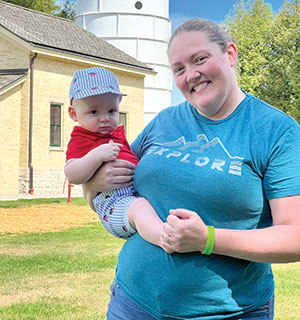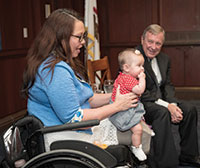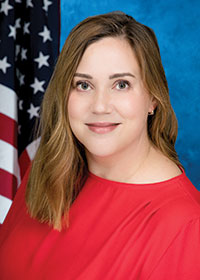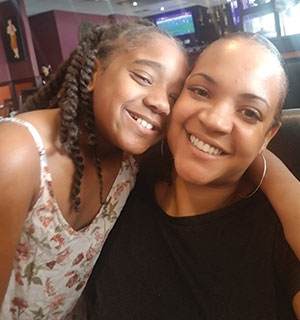
Former Iowa Army National Guard medic Jess Beswick remembers the first time she felt like she let her child down. It’s a feeling any parent will inevitably know, but Beswick experienced it before she even gave birth.
At 30 weeks pregnant, and despite her best efforts to be the picture of health, she was diagnosed with gestational diabetes.
“That felt to me like I was failing,” Beswick said. “It was probably my lowest point in the pregnancy.”
It wasn’t the only low point. Beswick’s journey to motherhood began with unexplained infertility that persisted for years. When she finally became pregnant at 37, she experienced a slew of complications, including high blood pressure that turned into preeclampsia and placenta accreta, a condition that can cause severe blood loss.
“That was scary for us because, at one point, they were talking about potentially having to give me a hysterectomy as part of my C-section,” Beswick said. “And we want more kids.”
On top of everything, she had to manage post-traumatic stress disorder symptoms related to two deployments.
Beswick’s story is all too common among service members and veterans who become pregnant. Research shows they are more likely to experience certain complications. There’s some insight into why, but there is still much we don’t know.
A new law championed by DAV and spearheaded by Sen. Tammy Duckworth of Illinois aims to change that. The Protecting Moms Who Served Act, signed into law on Nov. 30, 2021, dedicates $15 million toward the Department of Veterans Affairs’ maternity care coordination program.
Perhaps more significantly, the law also calls for a comprehensive study on maternal mortality and severe complications among veterans. The Government Accountability Office is to complete the study by Nov. 30, 2023.


“This is going to be the first comprehensive look so that we know exactly the extent of the challenges that we’re dealing with,” said Duckworth, a mother, DAV member and combat-wounded double amputee veteran of the Illinois Army National Guard.
“Nothing like that has ever been done before.”
The stakes couldn’t be higher. Preliminary data from an ongoing study conducted by the VA Health Services Research & Development Service suggests that the rate of pregnancy-related deaths among veterans using VA benefits is nearly double the national rate.
‘As seamless as possible’
Due to concerns over the complications Beswick was experiencing, her cesarean section was scheduled five weeks ahead of her due date.
“They were worried that if I went into labor that I could bleed out,” she said.
On Dec. 22, 2021, despite all the obstacles, Beswick and her husband welcomed a healthy baby boy into their lives. They named him Griffin.
“He came out and he was fine,” Beswick said. “And I got to keep my uterus.”
Beswick credits the successful delivery to what she calls “overwhelmingly the best care” she’s ever received. It was covered through the VA and provided by the University of Iowa.
Across the VA health care system, maternity care is outsourced to community providers in non-VA facilities. To help expecting veterans navigate and access community care, every VA facility has a maternity care coordinator.
“We have a really, really good, dedicated maternal care coordinator at the VA in Iowa City,” Beswick said. “And she would check up on me every few weeks.”
During one call with her coordinator, Beswick mentioned that she was having difficulty sleeping. The VA sent her a pregnancy pillow. When Beswick was diagnosed with gestational diabetes, the VA offered a blood sugar tester.
“I cannot think of a single thing that was missing,” Beswick said of her care.
That experience is what Duckworth wants for every expectant mother getting care through the VA.
“I just want it to be as seamless as possible,” Duckworth said, adding that she still hears veterans complain of a lack of coordination between the VA and outside maternity care providers.
The senator has firsthand experience, too. When Duckworth had her second child and experienced problems with lactation support, she used her outside health insurance for care.
“It was just so much easier than trying to go through the whole system of the VA getting approval and a referral and all that,” she said. “That shouldn’t be the case. You shouldn’t have to have outside health insurance in order to access lactation support.”
According to Duckworth’s office, the culture of maternity care within the VA has undoubtedly changed since 1996, the year the department established coverage for such services, but some of those changes are relatively new for a health care system that dates back more than a century and still serves significantly more men than women.
In 2009, the VA hired its first director of reproductive health. In 2012, the maternity care coordination program was introduced. Meanwhile, more women are entering service. As of 2020, women made up 18.7% of the military force, according to the Department of Defense.


“The rise in the number of female veterans who are using [the] VA for care has been significant [and] it’s been fast,” said Dr. Amanda Johnson, director of reproductive health for the VA Office of Women’s Health.
“And these are people who are entering a health care system that really wasn’t initially built for them.”
Johnson notes that because the VA outsources much of its maternity care, veterans are using the same health care system as civilians. And the state of maternal health across the U.S. is alarming.
‘What we do know’
At roughly 26 for every 100,000 live births, the United States has the highest maternal mortality rate among developed nations, according to a USA Today investigation published earlier this year. Another approximately 50,000 women suffer severe complications or life-threatening injuries during childbirth every year.
No such comprehensive data exists specifically for military veterans, in part because not all veterans use the VA for maternity care, making it a difficult population to track.
“There is a lot we don’t know, and there’s a lot of reasons for that. Some of it is [because military service] really isn’t a monolithic experience, and we don’t have touch points with every person of childbearing potential who has served in the military,” Johnson said.
“What we do know about our population is that when we think about … the things that put people at risk for poor outcomes or morbidity or mortality, we know that our population has some risk factors that may make them more vulnerable.”
A recent survey of veterans who used VA maternity care showed that 37% were 35 or older. Being older puts people at higher risk for early pregnancy loss, hypertension, cardiovascular disease and diabetes, Johnson said.
Veterans using VA maternity care are also more likely than the general population to have one or more mental health diagnoses. Out of nearly 16,000 births within the VA health care system between 2000 and 2012, 19% of mothers had a current or past PTSD diagnosis, according to a 2017 study published by the journal Paediatric and Perinatal Epidemiology. The same study shows that for those with PTSD, the risk of gestational diabetes and preeclampsia increased 30% to 40%.
VA patients are also more likely to be nonwhite when compared with the general population. Nationally, the maternal mortality rate among non-Hispanic Black women is nearly three times higher than for non-Hispanic white women, according to the Centers for Disease Control and Prevention.


“The poor outcomes [among nonwhite women] are reflective of systemic issues that go far and deep in the U.S.,” said Jodie Katon, a core investigator at Health Services Research & Development in the VA Puget Sound Health Care System. “And we are sending our veterans into the same systems of care.”
Johnson believes the VA is uniquely positioned to provide the best maternity care in the country and be a model for the private sector, noting that those who use maternity benefits often use the VA for their primary care. That allows the same team of doctors to offer health care support tailored to that veteran.
“So I think we have an opportunity to recognize the risks in our population and then to intervene before pregnancy, during pregnancy and then [after pregnancy],” Johnson said.
But the need for maternity care and support starts well before the service member becomes a veteran and enters the VA health care system.
‘An important contribution’
Vivian Richards still wonders what her house would sound like if she had more children, more voices to fill its rooms.
When she enlisted in the intelligence branch of the Army in August 2000, her plan was to serve five years, become pregnant and transition back to civilian life. Her dream was to have as many as five kids.
Then 9/11 happened. That day changed the country and the course of Richards’ life. She’d go on to deploy to Iraq and Afghanistan in support of special operations.
“The responsibilities that come along with executing combat operations really just put any kind of personal goals to the back end,” Richards said. “And everything just became really mission focused.”


As she approached 10 years of service, Richards, then 32, felt the pull to have a child. She wasn’t ready to leave the Army, so she decided to try to juggle both. Days after enrolling in an infertility program, she learned she was pregnant.
“And then it kind of got real in the sense of, how am I going to do this and still meet what had become the most prevalent sense of obligation to me, which was my obligation to my team, obligation to my soldiers, my obligation to the Army,” she said.
Later that year while she was still on active duty, Richards gave birth to her daughter, Axelle, at the Walter Reed National Military Medical Center. She described that experience as terrifying. Richards said she had a birth plan that included natural delivery, but those plans were ignored once she got to the hospital. She didn’t even know who her care team would be until she showed up.
After she gave birth, the clock started ticking. In two months, Richards would be back at work. By the six-month mark, she’d be considered deployable.
Meanwhile, she was navigating conflicting identities of soldier and mother, along with PTSD from previous deployments and postpartum depression that made bonding with her child difficult.
Through it all, Richards didn’t feel like she had the support of the systems around her.
“It’s like you’re rejecting the tribe,” she said of attitudes toward women getting pregnant in the military.
Richards retired as a sergeant major in September 2020. She never had more children.
Beswick, the former Army National Guard medic, said stories like Richards’ are why she didn’t want to start a family while in service. She saw other mothers do it and how difficult it was for them. In July 2012, she separated from the Army National Guard.
“I didn’t want to have to put that part of myself on hold for the military,” Beswick said of motherhood. “I felt, at 10 years, that I had given enough.”
Proponents hope the Protecting Moms Who Served Act is a step toward creating a more supportive environment for veterans and service members who become mothers. The study commissioned by the law will include active-duty service members who use TRICARE for maternity care.
“Women can really provide an important contribution to the effort, and so, if you want to retain good women, smart women, hardworking women, you have to provide for all of their needs comprehensively,” said Beswick.
DAV National Legislative Director Joy Ilem said exceptional maternity care for those female service members once they become veterans is part of our nation’s sacred promise.
“Through community care, the VA is poised to provide a quality of coordinated health care for women veterans that far exceeds what is available exclusively in the private sector,” Ilem said. “Considering the sacrifices women make in service to our country, this is the least we can do.”






